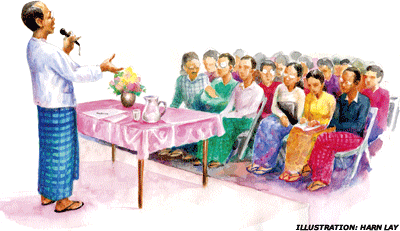Literature in Paralysis
The National Literary Awards
In

“Along the tour, we, the writers, can touch and hear directly the feelings of the people,” says Nu Nu Yi, a famous female novelist and Literary Award recipient. “We do this because of our love of literature.”
The Burma Writers Union was established before World War II and was allowed to continue to operate through the Japanese occupation. In 1944 the group inaugurated a festival in honor of the literati (sarsodaw). The day is dedicated to Pon Nya, a famous 19th century poet and playwright. “Sarsodaw-nei” or “Literati Day” is celebrated during “Natdaw”, the ninth month of the Burmese lunar calendar, which falls in November-December on a western calendar.
“Literati Day was born from the era of anti-fascist struggle, so the writers have a common history of resistance,” remarked Dagon Taya, a leading post-war writer. After
Writers are held in high esteem by the Burmese as philosophers, sources of knowledge and guides to living. This admiration is perhaps culturally related to the respect paid to the wisdom of prominent Buddhist monks on the part of ordinary Burmese.
1 | 2 | 3 next page »
